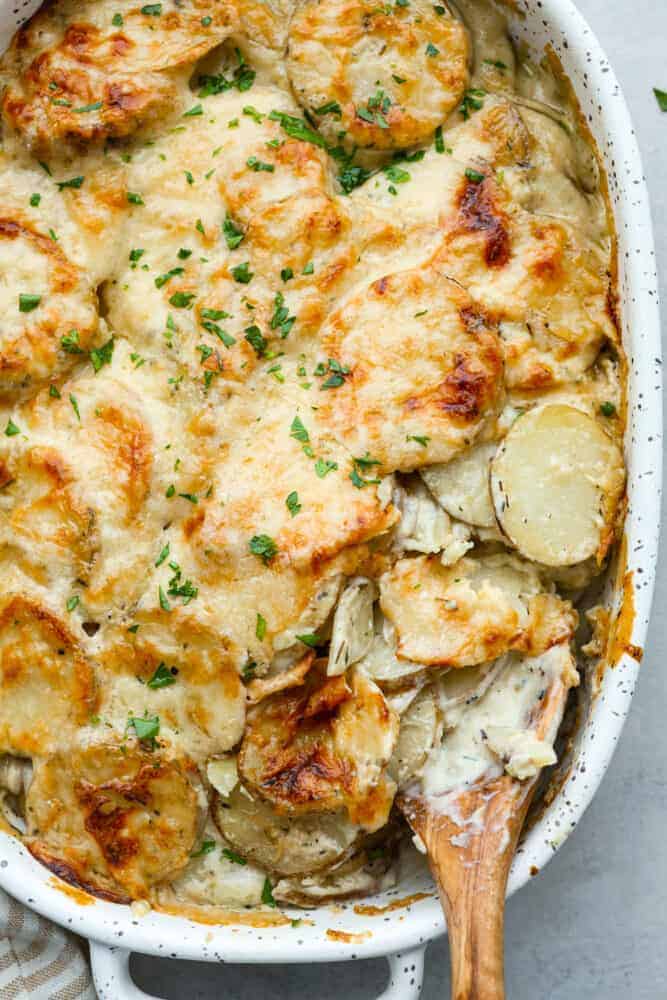This website may contain affiliate links and advertising so that we can provide recipes to you. Read my privacy policy.
Scalloped potatoes are thinly sliced layered potatoes baked in a creamy garlic and herb sauce, making them tender and flavorful. Hearty and easy to make, this is the perfect side dish to any meal!
If you’re in need of an easy side dish that is sure to impress then this is the recipe for you! These thinly sliced potatoes bake up extra creamy. The entire dish is so flavorful thanks to the addition of garlic and herbs. Serve this alongside the Garlic and Herb Prime Rib, Beef Tenderloin, Beef Wellington, or this Classic Honey Glazed Ham.
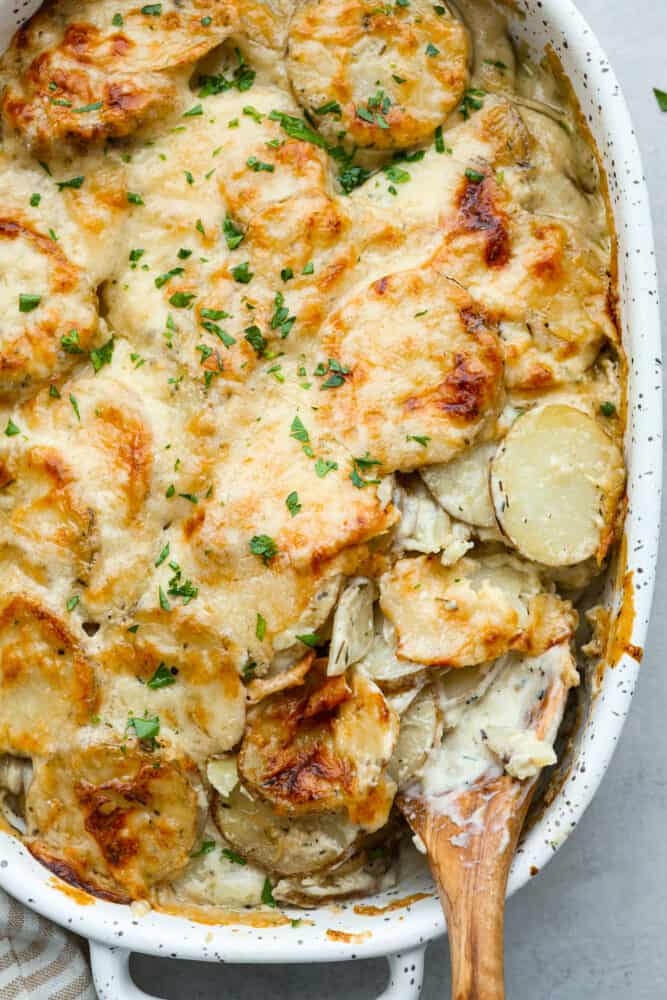
The Best Scalloped Potatoes
Potatoes are basically side dish magic. They can do so many things. And no matter how you make them, they usually end up being the highlight of the meal! These scalloped potatoes are no different. This recipe is easy to make and only needs a handful of ingredients.
The scalloped potatoes are covered in a creamy sauce made with garlic and parmesan. It not only helps to tenderize the potatoes, but gives the dish the best flavor ever! These always fly off the table whenever I make them. They’re the perfect side dish to serve alongside any hearty meal!
Ingredients Needed
Making this hearty, flavorful side dish doesn’t require many ingredients at all! Here’s everything you need, keeping it short and sweet with things you’ll likely have on hand already. Exact measurements are in the recipe card below.
- Yukon Gold or Russet Potatoes: These potatoes form the base of scalloped potatoes. They are starchy and hold their shape well during cooking, creating tender layers. Use either type based on your preference!
- Whole Milk: Whole milk makes the sauce nice and creamy. It also adds richness and a smooth texture to the scalloped potatoes.
- Heavy Cream: Combined with the whole milk to create a luscious texture. If you prefer a slightly lighter version, substitute with half and half.
- Salt and Pepper: Ensure the potatoes and sauce are well-seasoned. Season to taste!
- Bay Leaf: Infuses a gentle earthy and floral aroma into the dish.
- Thyme: Thyme is a versatile herb with a minty and lemony taste. It complements the scalloped potatoes perfectly. Fresh or dried thyme both work!
- Garlic: Garlic adds a strong, savory and delicious flavor to the scalloped potatoes. Use fresh minced garlic so your dish has the best flavor!
- Parmesan Cheese: Freshly grated Parmesan cheese brings a sharp, nutty, and savory flavor to the dish. It forms a golden and crispy crust on top when baked, adding a delightful texture. You can also try using different types of cheese, like gruyere or cheddar!
What Potatoes are Best?
Russet potatoes or Yukon Gold potatoes are great choices for making scalloped potatoes. The reason behind that is the starches. This is going to help the sauce thicken and become velvety smooth during baking. Russets have the most starch, Yukon Golds come in close behind. The Yukon Golds themselves bake up a bit creamier than the Russets, but the sauce itself might be a bit thinner. It’s all about what you prefer.
How to Make Scalloped Potatoes
These scalloped potatoes only take 15 minutes of prep time, which makes them perfect for popping in the oven before a gathering with friends or family!
- Preheat Oven, Prep Pan: Preheat oven to 350 degrees Fahrenheit. Spray a 2 quart glass or ceramic baking dish with non stick cooking spray and then set aside.
- Slice Potatoes: Clean and dry the potatoes. Slice the potatoes evenly into ¼ inch slices. You can peel the potatoes if you prefer before slicing, but it’s not required.
- Add Sauce Ingredients: In a large pot or dutch oven add the milk, cream, salt and white pepper. Stir to combine.
- Stir in Seasonings: Add in the bayleaf, fresh thyme and garlic. Stir. Heat over medium/low heat just to heat the milk, not to bring to a boil.
- Add Potatoes: Add in the potatoes. There isn’t enough cream to cover the potatoes. Carefully stir so that all of the potatoes are able to be warmed in the milk mixture.
- Transfer to Baking Dish: Using a slotted spoon remove the potatoes from the cream and then lay in the baking dish in even layers.
- Cover With Cream and Cheese: Pour the cream over the top of the potatoes. Then top with shredded parmesan cheese.
- Bake: Bake for 50-60 minutes uncovered at 350 degrees Fahrenheit until the potatoes are fork tender and the top is golden.
- Allow Sauce to Thicken: Remove from the oven and allow the dish to sit for at least 10 minutes prior to serving, this allows time for the cream to thicken slightly while cooling.
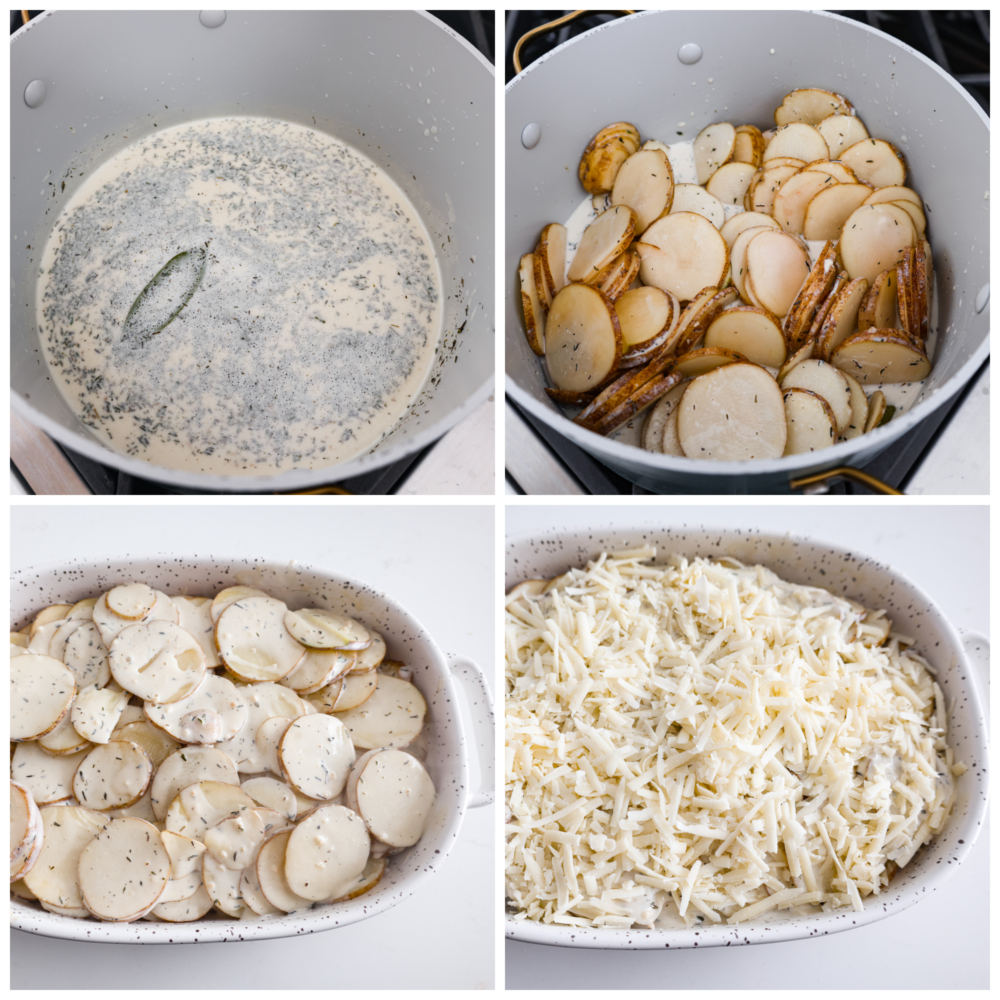
Scalloped Potatoes vs. Potatoes Au Gratin
They’re actually different. Although, most people will use the terms interchangeably. Scalloped potatoes are traditionally sliced thinner, about 1/8th of an inch thick. Potatoes Au Gratin will have a thicker slice of ¼ inch. Scalloped potatoes are cooked in a cream sauce while potatoes au gratin are cooked in a cream sauce and layered with cheese. If you’re pro-cheese like me, then by all means, add cheese to your scalloped potatoes and call them whatever you want. In fact, we’ll be putting some fresh grated parmesan on these potatoes. Cheese and creamy potatoes just go together too perfectly.
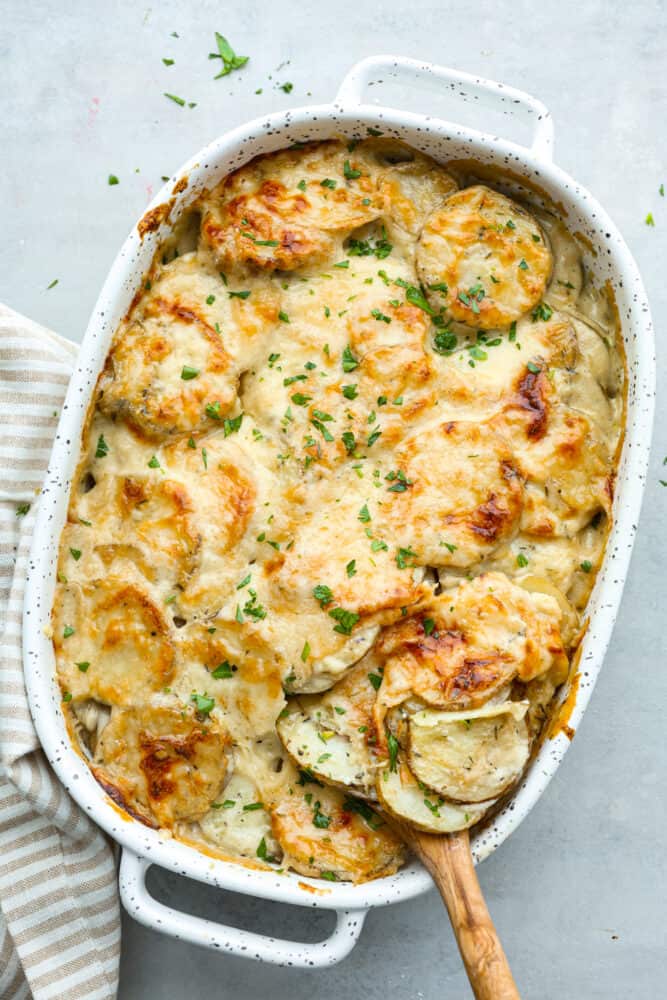
Tips for Making the Best Scalloped Potatoes
Although scalloped potatoes are fairly easy to make, here are a few extra tips to keep in mind so they turn out perfectly.
- Uniform Slices: The potatoes need to be sliced nice and thin. It’s also important that they are all cut to the same width. Using a sharp knife will help with this. If you have some thick slices and some thin slices, the potatoes will bake unevenly. The thicker slices won’t be cooked through and the thinner slices could cook too much and turn into mashed potatoes.
- Use a Mandolin Slicer: If you have one of these on hand it will make the slicing process fly by quickly, just be careful with your fingers.
- Can I Omit the Heavy Cream? I don’t recommend it. The reason that cream or half and half is used in combination with the whole milk is that you need a high fat content. Otherwise, when baked, the milk will curdle and separate. Using cream prevents the curdling from taking place.
- More Mix-Ins: Make these potatoes your own! Try adding cubed ham, caramelized onions, bacon, chives, green onions, herbs, you name it!
Storing Leftovers
Like a lot of other potato dishes, scalloped potatoes make great leftovers! Just let them cool down completely and then transfer them to an airtight container.
- In the Refrigerator: Scalloped potatoes will last for up to 4 days. Make sure you keep them wrapped tightly with plastic wrap or stored in an airtight container.
- Reheating: Reheat potatoes in the microwave until warmed through, or in the oven for about 10 minutes at 350 degrees Fahrenheit.
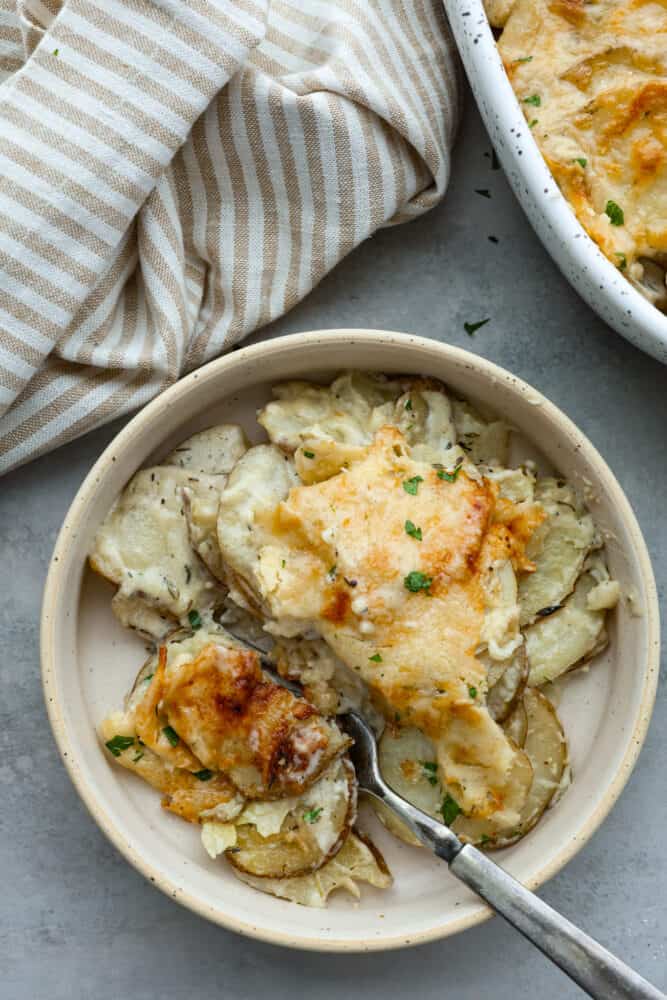
-
Preheat oven to 350 ℉. Spray a 2 quart glass or ceramic baking dish with non stick cooking spray and set aside.
-
Clean and dry the potatoes. Slice the potatoes evenly into ¼ inch slices. You can peel the potatoes if you prefer before slicing, but it’s not required.
-
In a large pot or dutch oven add the milk, cream, salt and white pepper. Stir to combine.
-
Add in the bayleaf, fresh thyme and garlic. Stir. Heat over medium/low heat just to heat the milk, not to bring to a boil.
-
Add in the potatoes. There isn’t enough cream to cover the potatoes. Carefully stir so that all of the potatoes are able to be warmed in the milk mixture.
-
Using a slotted spoon remove the potatoes from the cream and lay in the baking dish in even layers.
-
Pour the cream over the top of the potatoes.
-
Top with shredded parmesan cheese.
-
Bake for 50-60 minutes uncovered at 350℉ until the potatoes are fork tender and the top is golden.
-
Remove from the oven and allow the dish to sit for at least 10 minutes prior to serving, this allows time for the cream to thicken slightly while cooling.
Updated on May 22, 2023
Serves: 8
Calories172kcal (9%)Carbohydrates3g (1%)Protein6g (12%)Fat15g (23%)Saturated Fat9g (45%)Cholesterol52mg (17%)Sodium661mg (28%)Potassium79mg (2%)Fiber1g (4%)Sugar2g (2%)Vitamin A584IU (12%)Vitamin C1mg (1%)Calcium204mg (20%)Iron1mg (6%)
All nutritional information is based on third party calculations and is only an estimate. Each recipe and nutritional value will vary depending on the brands you use, measuring methods and portion sizes per household.


